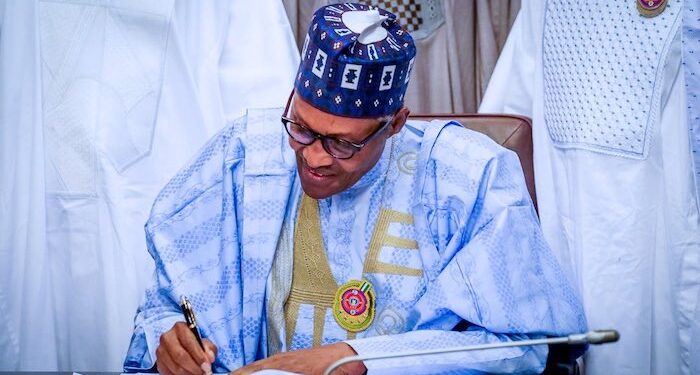President Muhammadu Buhari of Nigeria has signed into law the modification to the country’s constitution that permits states to create, transfer, and distribute power in areas served by the national grid.
This is one of the 19 legislations the President signed on Friday, 16 of which amended provisions of the Constitution of 1999 – Fifth Amendment Bills 2023.
Constitution Fifth Amendment Bill No. 45, Timeframe for the Submission of Ministerial or Commissioner Nominations, requires the president-elect to submit the names of his ministerial candidates to the National Assembly within two months of his inauguration.
The law, which goes into effect immediately, also applies to all governors-elect, who must seek the approval of the state legislature for their commissioner selections within 60 days of their inauguration.
In a statement released yesterday, Senior Special Assistant to the President on National Assembly Matters (Senate) Senator Babajide Omoworare explained that the President had also signed financial independence for State Houses of Assembly and State Judiciary – Fifth Amendment Bill 2023 No. 9 into law.
In January of this year, the National Assembly forwarded to the President sixteen measures comprising the Constitutional Alterations of the 1999 Constitution of the Federal Republic of Nigeria (as amended).
With the passage of the Fifth Amendment Bill No. 33, Devolution of Powers (National Grid System), Nigeria’s 36 states can now participate in the generation of power.
Fifth Amendment Bill No. 31, Devolution of Powers for Correctional Services, is a constitutional amendment that permits the rebranding of the Nigeria Prison Service to the Nigeria Correctional Service.
The Fifth Amendment Bill No. 32, evolution of Powers, Railways, allowed state governments the authority to start their own railway service. This removes the railway from the Exclusive Legislative List and places it on the concurrent list.
A portion of Omoworare’s statement reads, “The highlights of the assented Constitutional Alteration Bills include, among others, the following: Ensuring the financial independence of State Houses of Assembly and State Judiciary; Regulating the first session and inauguration of members-elect of the National and State Houses of Assembly; and for related matters.
“Ensuring that the President and governors submit the names of people nominated as ministers or commissioners for confirmation by the Senate or state house of assembly within sixty days of taking the oath of office; and for other purposes.
“Allow states to generate, transmit, and distribute electricity in regions covered by the national grid; and for related matters; Excluding the period of intervening events in the computation of time for deciding pre-election matters petitions; Regulating the first session and inauguration of members-elect of the National and State Assemblies.
“Changing prisons to correctional service and redesignating correctional service in the concurrent list; and transferring the item “railway” from the exclusive legislative list to the concurrent list.”
Omoworare stated that the President also approved three other legislation, including “The Nigerian Institute of Leather and Scientific Technology Act, The Nigerian Institute of International Relations Act, and The Federal Medical Centres (Amendment) Acts.”
In January, the National Assembly sent 35 Constitutional amendment bills to the President for assent, in response to a Senate resolution directing the former Clerk of the National Assembly, Mr. Olatunde Ojo, to forward all proposed legislation that met the assent requirement stipulated in Section 9 (2) of the 1999 Constitution.
In the meantime, the Deputy Speaker of the House of Representatives, Ahmed Idris Wase, has praised President Buhari for approving a number of bills that amended a number of provisions of the Constitution of 1999.
Wase, who is also the chairman of the Special Ad-hoc Committee for the examination of the 1999 Constitution, said that the Constitution (Fifth Amendment) bill, 2023 is divided into sixteen separate bills.
Four of the legislation were centred on the devolution of powers/promotion of genuine Federalism, as well as the strengthening of State Houses of Assembly and the Judiciary.
The Deputy Speaker further congratulated members of the 9th National Assembly for their persistent efforts to pass “these legacy laws.”


